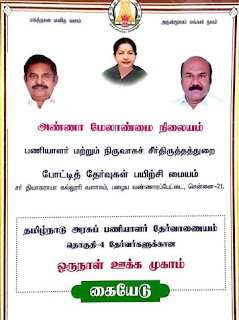The
winners of the 66th National Film Awards have been announced.
Most film-friendly state: Uttarakhand
Best book on cinema:
Malayalam Book Mano Prarthana Pulley written by S.Jeyachandran;
In A Cult Of Their Own - Ambirish Roy
chaudry gets Special Mention
Best Film Critic: Blase Johnny
(Malayalam), Ananth Vijay (Hindi)
NON FEATURE FILM CATEGORY
Best Film on Family Values: Chalo Jeetey
Hai
Best Short Fiction Film: Kasab
Social Justice Film: Why Me - Directed by
Harish sha , Ekant - Directed by Miraj singh
Best Investigation Film: Amoli
Best Sports Film: Swimming Through The
Darkness - Supriya
Best Educational Film: Sarlabh Virala
Best Film on Social Issue: Talate Kunji -
Shilpa Gholati
Best Environmental Film: The World's Most
Famous Tiger
Best Promotional Film: Rediscovering
Jahannum
Best Film on Science and Technology: GD
Naidu: The Edison of India
Best Arts and Cultural Film: Munkar
Best Debut non-feature film of a Director: Feluda
Best Non-Feature Film: Sunrise, The Secret
Life of Frogs
FEATURE FILMS:
Actors who get special mention for their
performance: Sruthi Hariharan, Chandrachud Rai, Josy Joseph,
Savitri
Best Rajasthani Film: Turtle
Best Panchanga Film: In The Land Of
Poisonous Women
Best Garo Film: Anna
Best Marathi Film: Bhonga
Best Tamil Film:
Baram , Directed by Priya Krishnaswami.
(பாரம் என்ற தமிழ்படம் சிறந்த படத்திற்கான தேசிய விருதை வென்றுள்ளது) .
Best Hindi Film: Andhadhun
Best Urdu Film: Hamid
Best Bengali Film: Ek Je Chhilo Raja
Best Malayalam Film: Sudani From Nigeria
Best Telugu Film: Mahanati
Best Kannada Film: Nathicharami
Best Konkani Film: Amori
Best Assamese Film: Bulbul Can Sing
Best Punjabi Film: Harjeeta
Best Gujarati Film: Reva
Best cheoreophy: Padmaavat, Ghoomar
Best music director: Padmaavat
Best special effect: Awe, KGF
Best music direction: Sanjay Leela
Bhasali, Padmaavat
Best background music award: Uri
Best Makeup Artiste: Ranjith for Awe
Best costume designer: Mahanati, Rajshree
Patnaik, Varun Shah and Archana Rao
Best Action: KGF
Best Lyrics: Manjutha for Nathicharami
Best Production Design: Kammara Sambhavam
Best Editing: Nathicharami
Best Location Sound: Tendlya
Best Sound Design: Uri
Best Mixed Track: Rangasthalam
Best Original Screenplay: Chi Arjun La Sow
Best Adapted Screenplay: Andhadhun
Best Dialogue: Tarikh
Best Cinematography: Ulu
Best Female Playback Singh: Bindu Mani for
Mayavi Manave from Nathicharami
Best Male Playback Singer: Arijit Singh for
Binte Dil from Padmaavat
Best film on social issues: Pad Man
Best Supporting Actress: Surekha Sikri for
Badhaai Ho
Best Supporting Actor: Swanand Kirkire for
Chumbak
Best Actor: Ayushmann Khurrana, Andhadhun,
and Vicky Kaushal, Uri
Best Actress: Keerthy Suresh for Mahanati
Best Direction: Aditya Dhar for Uri
Best Feature Film: Helaru (Gujarati)
Best Children's Film: Sarkari. Hi. Pra.
Shale Kasaragodu, Koduge
Best Film on Environment Conservation: Paani
Nargis Dutt Award for National Integration: Ondanya
Eradalu
Best Popular Film Providing Wholesome
Entertainment: Badhaai Ho
Jury Awards: Kedara (Bengali), Helaru
Indira Gandhi Award for Best Debut Film of A Director:
Sudhakar Reddy Yakanthi for Naal




